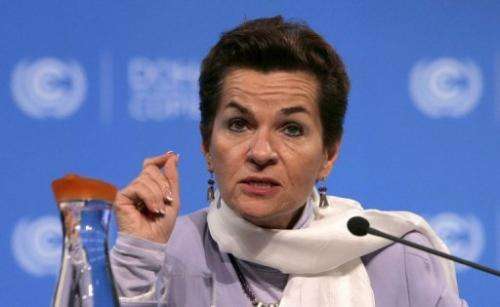Tempers fray over Russian block at climate talks

A key panel at UN climate talks in Bonn went into deep freeze on Tuesday as Russia ignored pleas to end a procedural protest, according to a webcast of the meeting and sources there.
Supported by Belarus and Ukraine, Russia refused to let work start in the Subsidiary Body for Implementation (SBI), an important technical committee in the climate talks, more than a week after the 12-day negotiations began.
Observers said if the three countries did not back down, the future of the entire UN process to fight greenhouse-gas emissions would be at risk.
"It's a most unfortunate situation," said Christiana Figueres, head of the UN Framework Convention on Climate Change (UNFCCC), as delegates admitted the panel will most likely have achieved nothing by Friday's close.
The Russians are incensed by what happened at the UNFCCC's last big annual meeting, held in Doha, Qatar, last December.
They complain they were ignored by the conference's Qatari chairman, who gavelled through a deal that extended the Kyoto Protocol.
The decision at Doha hamstrung Moscow's planned sale of 5.8 billion tonnes of carbon credits that Russia had amassed under the first round of the Kyoto Protocol.
It had gained these credits not through emissions reductions efforts, but after market pressure forced the closure of CO2-spewing factories following the fall of the Soviet Union.
Facing pleas and ill-disguised criticism from other delegates, Russian chief negotiator Oleg Shamonov on Tuesday said his country would not back down over what it felt was a matter of principle.
"This is a country-driven process... emotions must be set aside," he said.
Arguing for transparency in UN decision-making, he said, "Our intention is to bring the process from behind the looking glass."
Other countries expressed sympathy with Russia's argument but with the exception of its two allies, none backed its tactics and several voiced frustration.
Fiji, speaking for an alliance of developing countries that includes China, begged for action.
"Please don't walk off, please don't close the door and turn off the lights," its delegate said.
"We are all here as sovereign member states. Let us not tie the noose around our necks on some procedural issues."
To applause, Tuvalu, a small-island state worried by sea-level rise, asked: "Do we have to bury ourselves in procedural matters and not address important issues? Are we getting the impression that three parties are not interested in climate change? That seems to be the impression we are getting."
The quarrel touches at the heart of how decisions at the 20-year-old climate forum are adopted.
Bedevilled by defence of national interests, nit-picking and bickering, the 195 parties to the UNFCCC struggle to agree on curbing carbon emissions and helping poor countries adapt to worse floods, storms, droughts and rising seas.
Since 2009, the big decisions at the annual ministerial get-together have been reached in the pre-dawn hours amid scenes of exhaustion—and only after use of the gavel has sidelined dissenters.
Supporters of the technique say decisions would be even weaker and more laborious if formal unanimity were required.
The SBI, the committee deadlocked by the spat in Bonn, is a standing body tasked with carrying out decisions made in other UNFCCC arenas.
The gridlock means that the UNFCCC will head towards its annual meeting in Warsaw from November 11-22 with scant preparation for several big problems.
They include a method of common accountancy to show how developing countries are meeting emissions goals and how to build a mechanism to support countries badly hit by climate change.
Both projects are highly technical but potentially explosive in negotiations.
Warsaw is a stepping stone towards a planned pact to roll back greenhouse-gas emissions, which would be signed at the end of 2015 and take effect from 2020.
"If these three countries maintain their positions until 2015, they could wreck the entire process," one observer warned AFP.
© 2013 AFP





















